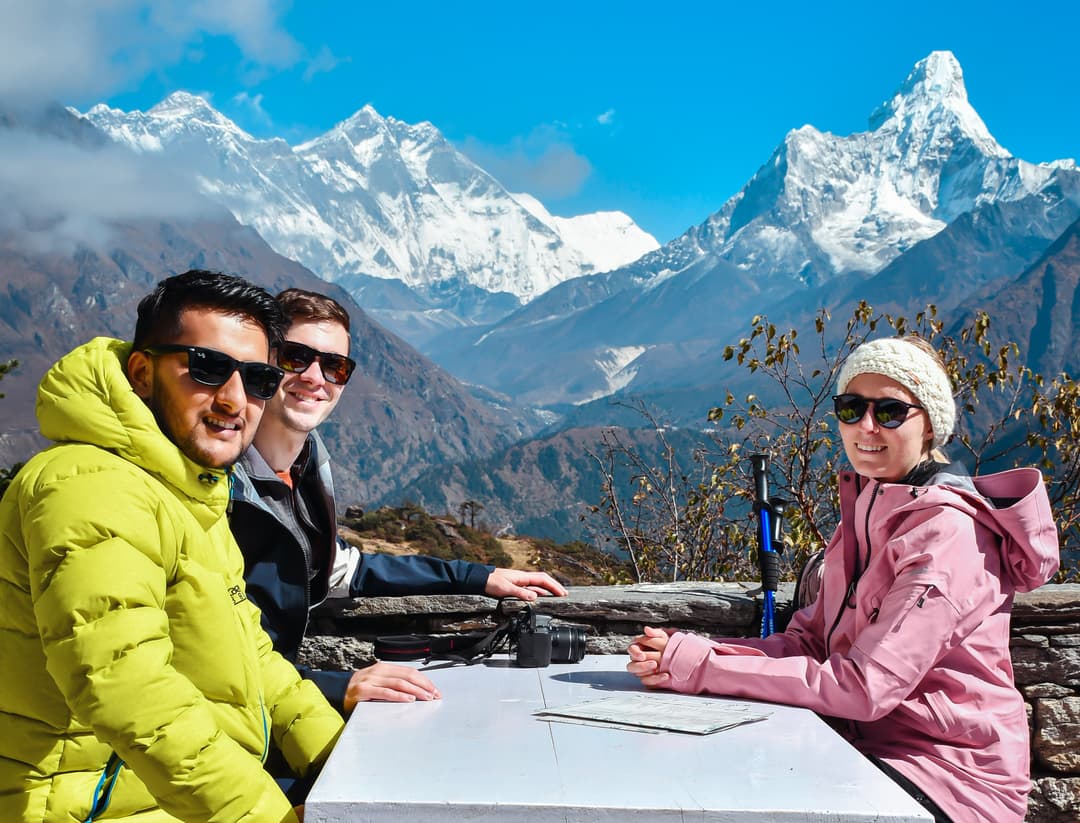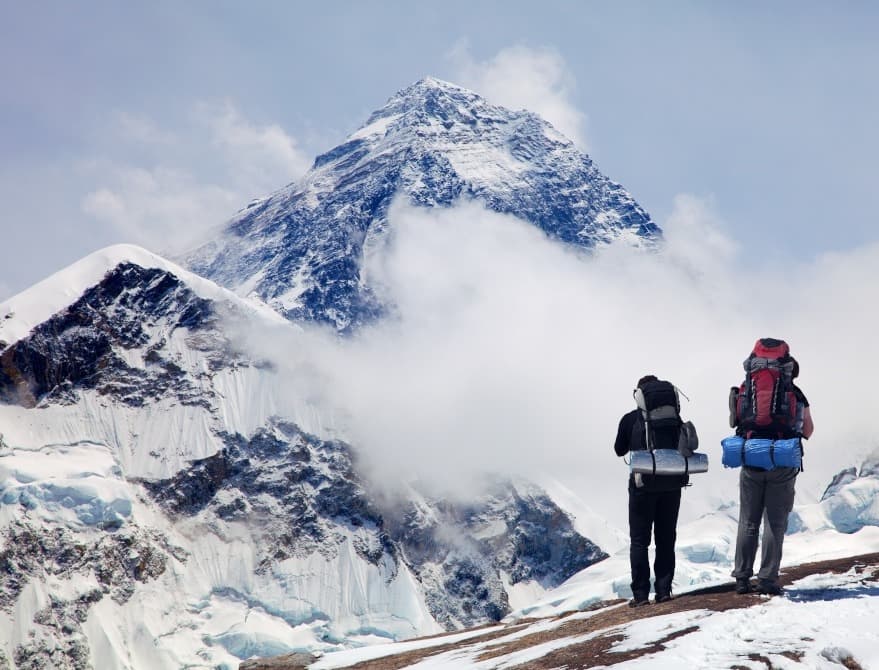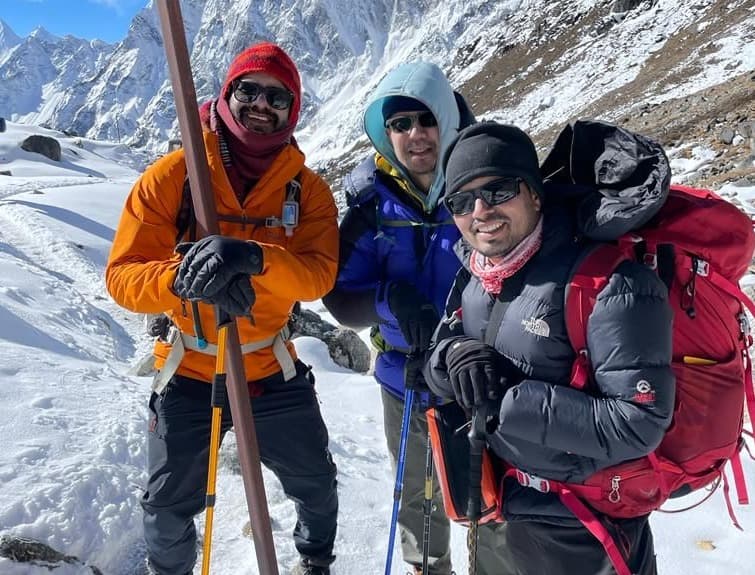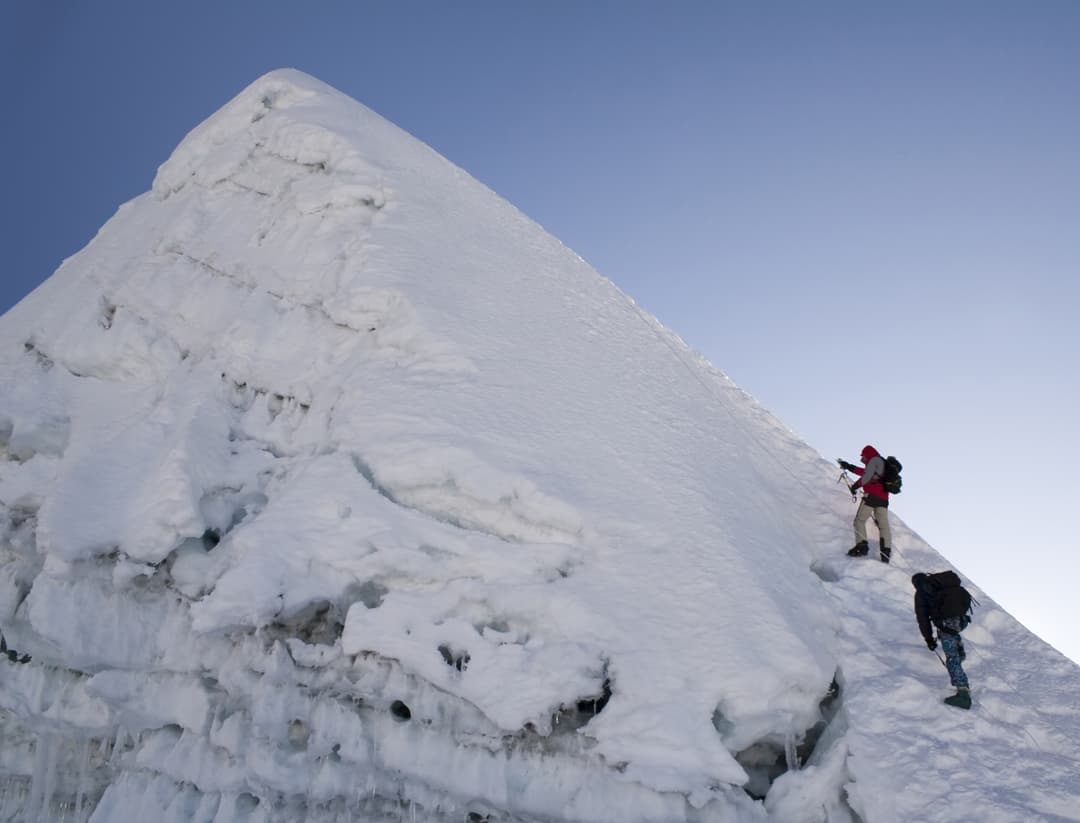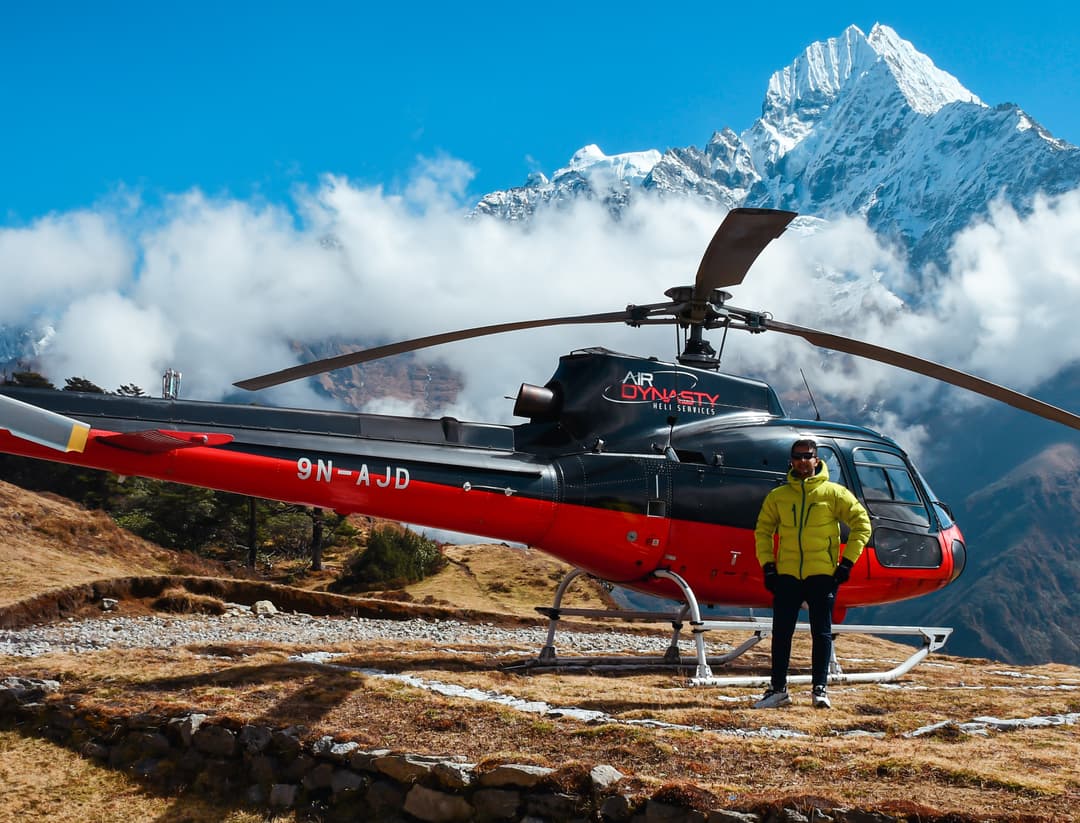Everest Base Camp Trek Cost for 2024-25
Are you planning to trek to Everest Base Camp and wondering about the cost? we will provide you with detailed information about the cost of Everest Base Camp trek for a single person and for a group.
Himalaya Land Treks is a renowned trekking agency in Nepal that offers Everest Base Camp trek at a competitive price. The cost of the trek depends on the size of your group. The larger the group, the lower the cost per person. The cost of the Everest Base Camp trek with Himalaya Land Treks is as follows.
| For 2-5 persons |
USD 1550 |
| For 6-10 persons |
USD 1530 each |
| For 11-15 persons |
USD 1500 each |
| For a group of more than 16 people |
USD 1480 each person |
The cost includes all necessary trekking permits, accommodation, meals, transportation, and an experienced guide. You will also be provided with a porter to carry your luggage during the trek.
In conclusion, the cost of the Everest Base Camp trek with Himalaya Land Treks is reasonable and competitive. You can choose the size of your group according to your preference and budget. With experienced guides and excellent services, Himalaya Land Treks is the perfect choice for anyone looking to trek to Everest Base Camp.
Everest Base Camp Trek Package 2024-25
Looking for an adventure of a lifetime? Our exclusive Everest Base Camp Trek Package for 2024-25 is here to make your dreams come true. Immerse yourself in breathtaking vistas, conquer challenging terrains, and witness the magnificence of Mount Everest up close. With experienced guides, comfortable accommodations, and carefully planned itineraries, our package ensures an unforgettable trekking experience. Discover the wonders of the Himalayas with us. Book now and create memories that will last a lifetime.
Can Beginners Trek to Everest Base Camp?
Trekking to Everest Base Camp is a dream for many adventure enthusiasts, but is it feasible for beginners? With proper preparation and guidance, beginners can definitely embark on this exhilarating journey. Prior physical fitness training, acclimatization, and hiring an experienced guide are crucial factors to ensure a safe and successful trek. By following a well-planned itinerary, beginners can embrace the breathtaking Himalayan scenery, experience Sherpa culture, and accomplish an extraordinary feat. So, lace up your boots and let the Everest Base Camp trek become your thrilling initiation into the world of high-altitude adventures.
Best Time for Everest Base Camp Trek
Choosing the right time to embark on the Mount Everest Base Camp Trek can make a significant difference in your overall experience. The best time to go for the EBC trek is during the spring (March-May) and fall (September to November) seasons.
During these seasons, the weather is mild, and the skies are clear, offering unobstructed views of the majestic mountains. The temperature is perfect for trekking, and the trails are less crowded, allowing you to enjoy the serene beauty of the Himalayas.
On the other hand, winter (December-February) and monsoon (June-August) seasons are not ideal for the trek. Heavy snow and fog occur during the winter, while heavy rains occur during the monsoon season, making it difficult to trek. Flights to/from Lukla can also be delayed or canceled during these seasons, adding to the challenges.
However, if you plan a Heli tour to Everest Base Camp, you can visit the base camp all year round if the weather is nice. This is a perfect option if you want to avoid trekking and enjoy a comfortable and convenient way of experiencing the beauty of Everest.
In conclusion, planning your Everest Base Camp Trek during the best time can make your journey memorable and unforgettable. Consult with our tour operator to select the best time that suits your preferences and make sure you have a safe and enjoyable trek.
Everest Base Camp Trek Difficulty
Embarking on an Everest Base Camp trek is a dream for many, and rightfully so. The stunning vistas of the Himalayas, the challenge of the trek, and the sense of accomplishment that comes with reaching the base camp of the world's tallest mountain are all experiences that leave a lasting impression. However, it's important to be aware of the challenges that come with this adventure.
The Everest Base Camp trek is a difficult and challenging journey that requires physical fitness, mental toughness, and determination. You will be walking for 6-7 hours a day, sometimes on steep inclines, and at high altitudes up to 5545m. The lack of oxygen at high altitudes can make breathing difficult, and altitude sickness is a real possibility. This is not a journey to be taken lightly, and preparation is key.
But don't let the difficulty discourage you! The challenge is what makes the trek so rewarding. As you push yourself to your limits, you'll discover a sense of strength and resilience that you never knew you had.
To fully enjoy the trek, it's important to be prepared physically and mentally. Regular exercise and cardiovascular training can help you build endurance and stamina. Mental preparation, such as meditation or visualization techniques, can help you stay focused and motivated during the journey.
When you trek with Himalaya Land Treks, you're not just another client - you're part of our family! We'll be there for you every step of the way, from planning to the actual journey. Our team of experienced guides will ensure your safety and lead you through challenging terrain. You can count on our knowledge and expertise to make your trek successful and enjoyable. Let us share our passion for the Himalayas with you and make unforgettable memories together!
So, are you ready to take on the challenge of the Everest Base Camp trek? It won't be easy, but the rewards are more than worth it. Embark on this journey with Himalaya Land Treks and discover the strength and beauty of the Himalayas.
Preventing Altitude Sickness: Tips for Everest Base Camp Trek
Are you planning to trek to Everest Base Camp but worried about altitude sickness? Altitude sickness, also known as acute mountain sickness (AMS), is a common issue faced by trekkers in high-altitude regions like Everest Base Camp. It's a potentially serious condition that can lead to fluid buildup in the lungs and brain, making it important to take necessary precautions to avoid it.
At Himalaya Land Treks, our team of experienced trekkers always prioritizes your safety during your trek to Everest Base Camp. Here are some tips to prevent altitude sickness and make your trek enjoyable:
Take proper acclimatization breaks: It's crucial to take rest days every few days to allow your body to adjust to the altitude. This means avoiding strenuous activities during these rest days and staying hydrated, avoiding alcohol and caffeine, and eating high-calorie foods.
Take medication: It's recommended to take medication to prevent altitude sickness, which helps to reduce the symptoms of AMS by increasing the amount of bicarbonate in the blood. However, medication should not be considered a substitute for proper acclimatization.
Listen to your body: Always listen to your body and rest if you feel any symptoms of altitude sickness. Symptoms can range from mild to severe, including headache, nausea, dizziness, fatigue, and shortness of breath. Seek medical attention if your symptoms worsen.
In conclusion, altitude sickness is a serious condition that can be prevented by taking necessary precautions. At Himalaya Land Treks, our team will always be there to help you during your trek to Everest Base Camp. By following these tips and taking proper care of yourself, you can make your trek a safe and enjoyable experience.
Essential Gear and Equipment for a Successful Everest Base Camp Trek
When it comes to trekking to Everest Base Camp, having the right gear and equipment can make all the difference. Proper gear not only enhances your comfort level, but also ensures your safety and success on the trek. Here are some tips to help you choose the right gear and equipment for your Everest Base Camp trek.
Hiking boots: Good quality hiking boots are essential for any trekking adventure, especially for trekking in high-altitude regions like Everest Base Camp. Make sure to invest in boots that are sturdy, waterproof, and provide good ankle support. It is recommended to break them in before your trek to avoid blisters and discomfort.
Warm clothing: The weather in the Everest region can be unpredictable, with temperatures dropping significantly at night. It is important to pack warm clothing, including thermal underwear, a fleece jacket, down jacket, and warm pants. Layering is key to staying warm and comfortable throughout the trek.
Waterproof jacket: The Everest region is known for its frequent rain and snowfall, making a good quality waterproof jacket a must-have. Look for jackets that are both waterproof and breathable, to prevent sweat buildup and ensure comfort.
Gloves and hat: Gloves and a hat are essential for keeping your hands and head warm in cold weather. Look for gloves that are waterproof and insulated, and a hat that covers your ears.
Backpack: A good quality backpack is necessary to carry all your gear and essentials on the trek. Look for backpacks that are sturdy, lightweight, and have adjustable straps for a comfortable fit. It is important to pack light and carry only the essentials to avoid unnecessary strain and discomfort.
Sleeping bag: A warm and comfortable sleeping bag is essential for a good night's sleep on the trek. Look for sleeping bags that are lightweight, compact, and rated for sub-zero temperatures.
Trekking poles: Trekking poles can help reduce the impact on your knees and provide stability on uneven terrain. Look for poles that are lightweight, sturdy, and adjustable.
In conclusion, investing in good quality gear and equipment is essential for a safe and successful Everest Base Camp trek. It is important to research and choose the right gear based on your needs and preferences, and to pack light to avoid unnecessary strain and discomfort. By following these tips, you can ensure a comfortable and enjoyable trekking experience.
Permits and Fees for Trekking to Everest Base Camp: A Guide for Trekkers
If you're planning to trek to Everest Base Camp, you must be aware that it's a once-in-a-lifetime adventure that requires proper planning and preparation. One of the most crucial aspects of planning your trek is obtaining the necessary permits and paying the required fees.
As a trekker, the first permit you need to obtain is the Sagarmatha National Park permit. It is mandatory for all trekkers entering the park, which is a UNESCO World Heritage site. The permit fees contribute to the conservation and management of the park. The cost of this permit is NPR 3,000 for SAARC nationals and NPR 3,000 for foreign nationals, and it's valid for multiple entries during the trek.
Apart from the Sagarmatha National Park permit, you also need to get the Trekker's Information Management System (TIMS) card. The TIMS card is a database of trekkers, which helps the authorities to ensure the safety and security of trekkers in the region. The cost of this permit is NPR 1,000 for SAARC nationals and NPR 2,000 for foreign nationals.
Lastly, you'll also need to pay the Khumbu Pasang Lhamu Rural Municipality entry fee. This fee is used to maintain and develop the local infrastructure and facilities in the Khumbu region. The cost of this fee is $20 for foreign nationals and NPR 2,000 for SAARC nationals.
It is recommended to use a reputable trekking agency, such as Himalaya Land Treks, to obtain these permits and pay the required fees. The agency can assist you with the paperwork and logistics, ensuring that you have all the necessary permits and fees paid before starting your trek. By doing so, you can avoid any hassle and start your trek with ease.
It's crucial to note that trekking without the required permits and fees is illegal and can result in fines and penalties. Therefore, it's essential to make sure that you have all the required permits and fees paid. Additionally, the authorities conduct regular checks during the trek to ensure that trekkers have the required permits and fees paid.
How to Book Your Everest Base Camp Trek?
Looking for an unforgettable adventure to the Everest Base Camp? Look no further than Himalaya Land Treks, the premier trekking company in Nepal. With our expert guides and unparalleled experience, you can be assured of an incredible journey to the top of the world.
To book your Everest Base Camp trek with Himalaya Land Treks, first, choose your trekking package. We offer a variety of packages, from the classic Everest Base Camp trek to the more adventurous Gokyo Renjo La Pass trek. Once you have decided on your package, get in touch with our team to confirm your dates and book your trek. We accept a variety of payment methods, including bank transfer, and credit card.
With your trek booked, Himalaya Land Treks will provide you with a detailed packing list and guide you through the necessary preparations for your trek. We will also arrange for your permits and flights to Lukla, the starting point of your trek.
So, what are you waiting for? Enjoy stunning mountain landscapes, savor delicious Nepalese cuisine, and make memories that will last a lifetime with Himalaya Land Treks on your Everest Base Camp trek.


















